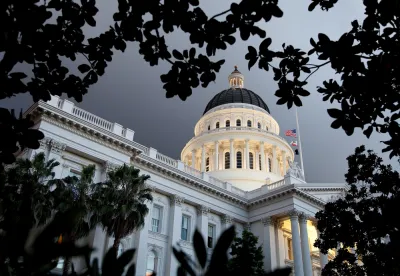The nation's only state-run, market-based program to reduce greenhouse gas emissions will continue until 2031 without fear of litigation, as it passed with the required two-thirds supermajority needed for tax increases, along with two related bills.

Gov. Jerry Brown called Monday's vote on AB 398 (the California Global Warming Solutions Act of 2006: market-based compliance mechanisms) by Assemblymember Eduardo Garcia (D-Coachella), the "most important vote" that legislators would take in their lifetimes, and they delivered, which the Democratic governor attributed in part to "mystery, miracle and prayer."
Brown wanted a two-thirds supermajority, just like a tax increase would need, to insulate it from legal challenges that current program has endured from the onset five years ago, though the state Supreme Court upheld the program last month. However, the authorizing legislation behind cap-and-trade, AB 32, the original Global Warming Solutions Act of 2006, only extends to the year 2020.
Bipartisan support for squeaker vote
Unlike another historic vote this session to hike the gas tax, the first time since 1990, the vote for cap-and-trade continuation beyond 2020 attracted minority Republican support, particularly in the assembly.
"Twenty-eight senators voted in favor — one more than needed," reports David R. Baker for the San Francisco Chronicle. "Surviving the assembly required 54 votes in favor, and the bill secured 55."
Sen. Tom Berryhill, R-Twaine Harte, was the only Republican senator to vote in support, though reluctantly, and only after he secured benefits for this rural, agricultural district.
"The Assembly majority included seven Republicans, among them the East Bay’s Catharine Baker," reports Katy Murphy for The Mercury News.
Environmental community split
Mainstream environmental groups like Natural Resources Defense Council, the Environmental Defense Fund, and the Union of Concerned Scientists supported AB 398 and its companion bill, AB 617 (Toxic Air Pollution Standards: to increase monitoring and impose stricter penalties on polluters), by Assemblymembers Cristina Garcia (D-Bell Gardens), Eduardo Garcia (D-Coachella), and Miguel Santiago (D-Los Angeles). Many more groups supported it as well, cited in the governor's press release on July 17.
Sierra Club California joined a coalition of 50 environmental justice and climate groups to oppose AB 398 and a companion constitutional amendment pushed by Republicans, ACA 1, that will require a two-thirds vote by the legislature to pass an expenditure plan for cap-and-trade revenues, known as the Greenhouse Gas Reduction Fund, by a two-thirds vote in 2024. First it must pass a vote by the general electorate in June 2018.
"Probably the biggest grievance environmental justice advocates had with AB 398, according to Bill Magavern, policy director of the Coalition for Clean Air, is a specific provision that prohibits California’s Air Resources Board and local air districts from directly regulating carbon emissions by sources that are also subject to the state’s cap-and-trade program," reports Ruairí Arrieta-Kenna for Vox.
However, the bill's author saw it differently.
"This air quality and carbon reduction package is reflective of a truly bipartisan, inclusive, collaborative process that ensures both economic relief and climate equity to disadvantaged areas, often low income communities of color that historically have been disproportionately impacted by pollution," stated Assemblyman Eduardo Garcia in his press release.
Gas price implications?
The current cap-and-trade program is said to have hiked prices by 11 cents per gallon, according [pdf] to the Legislative Analyst's Office. Opponents and supporters take different sides on how AB 398 will affect gas prices, reports the Sacramento Bee. The LAO has not analyzed AB 398.
Legacy for Brown
This was a must-win vote for the governor who has championed fighting climate change much like former President Obama who is now seeing that legacy undone by his successor, President Trump. Cap-and-trade is the most important mechanism California regulators have to reduce greenhouse gas emissions. Had AB 398 not attained the two-thirds threshold, it would have lessened Brown's leadership role in mobilizing the resistance to President Trump's destructive environmental agenda.
FULL STORY: California Legislature Approves Continuation of Cap-and-Trade Program

National Parks Layoffs Will Cause Communities to Lose Billions
Thousands of essential park workers were laid off this week, just before the busy spring break season.

Retro-silient?: America’s First “Eco-burb,” The Woodlands Turns 50
A master-planned community north of Houston offers lessons on green infrastructure and resilient design, but falls short of its founder’s lofty affordability and walkability goals.

Delivering for America Plan Will Downgrade Mail Service in at Least 49.5 Percent of Zip Codes
Republican and Democrat lawmakers criticize the plan for its disproportionate negative impact on rural communities.

Test News Post 1
This is a summary

Test News Headline 46
Test for the image on the front page.

Balancing Bombs and Butterflies: How the National Guard Protects a Rare Species
The National Guard at Fort Indiantown Gap uses GIS technology and land management strategies to balance military training with conservation efforts, ensuring the survival of the rare eastern regal fritillary butterfly.
Urban Design for Planners 1: Software Tools
This six-course series explores essential urban design concepts using open source software and equips planners with the tools they need to participate fully in the urban design process.
Planning for Universal Design
Learn the tools for implementing Universal Design in planning regulations.
EMC Planning Group, Inc.
Planetizen
Planetizen
Mpact (formerly Rail~Volution)
Great Falls Development Authority, Inc.
HUDs Office of Policy Development and Research
NYU Wagner Graduate School of Public Service


























